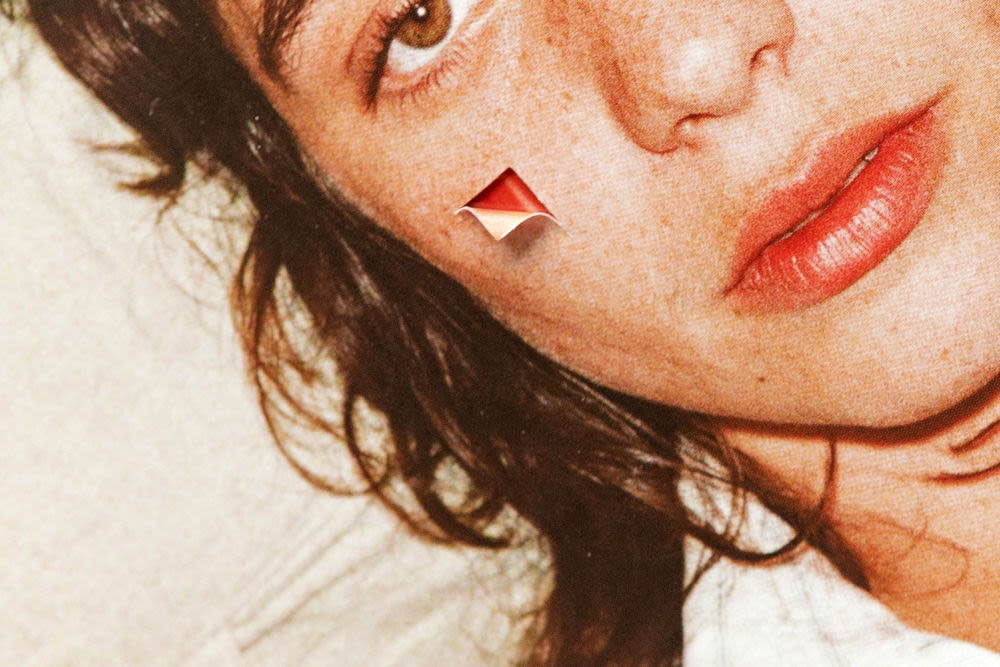It always starts so innocently. A post-mortem pimple scab or a just-birthed whitehead on your face, waiting to be picked. One part of your mind says you shouldn’t touch it, but another part tells you that it’s so easy, and just this one time! And also: It won’t leave a mark, you know what you’re doing… Skin picking at an occasional frequency is quite normal, even though it’ll make your dermatologist cringe. On a more compulsive level the practice is known as dermatillomania, which is a medical disorder that requires a professional diagnosis. Having read many a Top Shelf that described skin picking in great detail, ITG wondered: What is it that drives us all to pick, even against our better judgement? And how can we stop? Below, a conversation about it all. Self-professed skin-pickers and Glossier employees Sam, Ali, Utibe, Kate, and Cindy, along with psychologist Rachel Needle, discuss. Is there something that has helped you with picking? Share the wealth in the comments below.
Dr. Rachel Needle, Psychologist: Hi! I am Dr. Rachel Needle. I am excited to learn more from you and to discuss how people can stop unwanted picking.
Ali Oshinsky, Into The Gloss Editorial Assistant: I always think it’s OK to pop my pimples because I’m a licensed esthetician. I know the right way to do it, but I definitely take it too far on myself.
Sam Verdile, Glossier Corporate Communications: I’m not a licensed aesthetician, but I have convinced myself that I know which zits are ready to pick and how to do it without damaging my skin, thanks to years of practice. I love popping them, I can’t lie.
Utibe Mbagwu, Into The Gloss Content Coordinator: I kind of… love picking my face. But I know it’s bad for me.
Kate Turner, Glossier Manager of Workplace Experience: I had a terrible bout of picking throughout most of my twenties.
Cindy Cheng, Glossier Senior Project Manager, Offline + Experiential: I try very, very hard to not touch my face. I’ve read a lot of threatening articles about infections and scarring, and that turned me off to it. And I always have long gel nails that make it very difficult to pick.
Ali: How’d you figure out that hack?
Cindy: I’ve actually never considered it to be a hack—the desire to have long nails came first, and the inability to pick at my face was kind of an added bonus.
Ali: It’s funny, because I always keep my nails short because that way I know I can’t make any bad scars if I do decide to pop a zit.
Kate: When I keep my nails long that definitely helps me.
"I would feel an initial rush and release, and I knew I was up against something more serious when I would feel terrible after I picked, but still couldn’t stop."
Dr. Needle: What are some of the reasons you think you pick? Are their certain triggers you can identify?
Utibe: Checking my face in the mirror “to see how my zits are doing” is literally the first thing I do every morning. And I’m always feeling my cheeks to see if something new has arisen during the day or overnight.
Kate: For me, it started as an after school habit when I got home from grade school, and become something I did every time I was in front of a mirror. As I got older, I used it as a way to deal with all kinds of stress. It got so bad that I needed to see a therapist.
Ali: Kate, how did you feel after you picked?
Kate: I would feel an initial rush and release, and I knew I was up against something more serious when I would feel terrible after I picked, but still couldn’t stop. I was so ashamed, incredibly embarrassed, and I didn't really know why I was doing this thing that I absolutely hated. It was a vicious cycle. I decided to get professional help when I realized I wasn’t able to leave the house without makeup.
Dr. Needle: Feeling badly and even some embarrassment and shame is not uncommon. When you looked for help, what did you find?
Kate: I first went to a behavioral therapist and worked with her for about a year. I still picked at home, but didn't do it during the day in a public space. After about a year of that, I had a pretty bad attack and went after a cyst in my work bathroom. When I talked to my therapist about it, she recommended anti-anxiety medications, and that we visit a dermatologist together. Within a few months, my face looked completely different.
Cindy: For me, it’s kind of more fixation than a compulsion. For example, if I’m sitting in front of a mirror with 30 minutes to kill, I’ll touch my face. It’s the same with picking at split ends or my cuticles or peeling off a suntan.
"PIMPLE PATCHES are everything. They’re the only things that can stop me from picking!"
Sam: When people say they never, ever pick their skin, I always wonder if they could see a chipped nail and let it go, or leave that plastic protective film on a new iPhone for weeks on end.
Dr. Needle: The nature of an urge is that it passes. For example, if you give yourself 10 minutes to stare at the clock until you allow yourself to pick, oftentimes at that point you won’t still be thinking about it. That doesn’t mean you might not again in two or 20 minutes, but for that moment, you will have moved past it.
Utibe: I’m also conflicted, because we’re told we’re not supposed to pick our faces, but then so many people go to a facialist to have their faces professionally picked at. Is there truly any good way to pop a zit?
Ali: From being on the other side of this, I really feel like the answer is no—for several reasons. First of all, before you get an extraction during a facial, the skin has been totally cleaned and by law the aesthetician is wearing sanitary gloves. The angle is also totally different. We’re super close to the skin, and can clearly see the pore we’re working on under a light and a magnifying mirror. I’d say facialists are also more conservative than you might be on your own—they don’t want to hurt you, or scar you. I was always thinking about that when I was a student.
Utibe: Cool—so I should probably stop thinking to myself that popping my own zits is actually doing myself a service.
Ali: Do you think you consider it picking when the skin scabs and scars, or is any pimple-popping picking?
Utibe: I lump it all together. From the pop to the pick.
Cindy: I measure by duration—anything longer than two minutes in front of a mirror would be picking for me.
Kate: If I have a single whitehead or blackhead that I can tell will easily come out, I’ll wash my face and extract it. But I have to consciously tell myself out loud, “Now stop”. That’s the part I couldn't do before. It’s not something I do to cope with anxiety, I guess is the difference—I’m not going hunting for something to pick.
Ali: Let’s say we were all going to completely stop picking. Anyone have any hacks to do that?
Utibe: PIMPLE PATCHES are everything. They’re the only things that can stop me from picking! I feel so accomplished when I take them off the following morning.
Dr. Needle: Anything that makes picking more difficult can help—like covering them. It’s also important to know your triggers, and habit reversal techniques work for some, too.
Sam: What’s habit reversal?
Dr. Needle: When you do habit reversal training, you build awareness of your urges, reduce triggers as best you can, and try to develop a competing behavior to the response instead of picking.
Sam: I like the idea of learning a competing behavior. Just to let everyone know, over the course of this conversation, I’ve been picking at my split ends, my back, and my scalp.
"For long term, meditation, yoga, and swimming, all became huge tools for dealing with the source of the anxiety."
Ali: What are some good examples of competing behaviors that you recommend, Dr. Needle?
Dr. Needle: Really anything that keeps your hands busy doing other things and not accessible for picking—you could put on gloves, hold a tennis ball, write, knit…
Ali: Oh, Renée Rouleau actually sells a twisty toy that I think is meant for this. And you could also probably use a fidget spinner, too.
Kate: My therapist initially suggested a reward system where if I didn't pick my face for a day, I could wear makeup. Is that an example of habit reversal techniques?
Dr. Needle: No, that’s a reinforcement or rewards system. I actually don’t find those helpful, although I hope it worked for you.
Cindy: Meditation also helps me, if anyone’s into that. I find that it really disciplines your body to not make extraneous movements.
Utibe: Wow, that’s a great one! Now I have another reason to try and get back into mediation.
Kate: It was a huge help for me, too. I used therapy, medication, and prescription topical creams for immediate help—but for long term, meditation, yoga, and swimming, all became huge tools for dealing with the source of the anxiety.
Ali: OK, final thoughts. Do you think you’ll ever really stop picking?
Sam: I would love to stop picking—honestly, Kate has inspired me to consider therapy for the habits I’ve wanted to address for years and still haven’t been able to. But I’ll probably always pop my whiteheads because… they’ve got to go.
Ali: I also think we can remember that skin heals, and at the end of the day it’s more important to be mindful of how picking, or its results, is affecting you emotionally.
Utibe: This conversation has definitely made me more mindful about picking. Step two is tracking down what triggers me to do so, and having clearer ways to manage it.
Dr. Needle: Resist the urges, go to therapy, and enlist others to support you by telling them about what you’re going through, if you feel comfortable. That’s really all you can do.
Kate: I’ve also learned to not beat myself up just because I went after a single pimple. I still go to therapy, and I still use anti-anxiety meds, and I still take good care of myself to control my triggers. I’ve accepted my picking.
This conversation has been edited and condensed. Photo via ITG.

